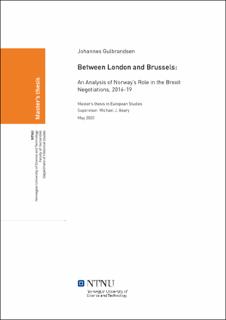| dc.description.abstract | This thesis is an analysis of what role, if any, Norway played during the Brexit negotiations. Norway was not an official part of the negotiations but nevertheless a relevant actor given its high level of integration with the EU and extensive cooperation with Britain. An important rational for the thesis’ scope was that Norway was highly incentivized to participate, yet lacked an official seat at the table. How the EEA-member overcame its limitation to play a role during the Brexit negotiations was an important aspect of this analysis. Embedded in the analysis of the features and dynamics of the role played by Norway lies an assessment of performance using indicators developed by Græger & Haugevik.
The thesis found that Norway first attempted to engage in trilateral negotiations between itself, the EU and Britain. Once this attempt had been denied by the EU, Norway was left attempting to promote their preferences into the negotiations through other actors. Norway used its experience as an EEA-member lobbying EU matters in Brussel to become involved with the Brexit negotiations. This was evident from both the strategy and the composition of the Norwegian Brexit Task Force. Through their strategy, Norway managed to play the role as an irregular third party in the Brexit negotiations.
As an irregular third party, Norway managed to achieve its predetermined objectives for Brexit, regardless of deal or no-deal outcome. Norway’s role witnessed it enter into no-deal preparatory agreements with Britain which would have seen the Nordic nation more prepared for a hard Brexit than the EU27. Norway also gained an acceptance and the participation of the EU, mainly through Barnier’s Task Force 50, to mirror EEA-relevant aspects of their deal with Britain. The thesis found that the role of Norway was in this way key for the EEA-member to achieve a higher degree of Brexit preparedness than any member state. Norway was able to enjoy the same terms as the EU27 had negotiated with Britain in a deal context, while also having entered into their own bilateral agreements in the case of a hard Brexit.
The thesis found that Norway’s role had a high level of performance, although it lacked in viability and its achievements may yet prove temporary. Further, I argue that the other actors’ perception of Norway’s role as relevant in a Brexit context rose as a consequence of the attention brought to the EEA-agreement. This attention, which had a high compatibility with the Norwegian government’s strategy, was significant for the role Norway was able to play. The Norwegian government largely succeeded in playing a large enough role in the Brexit negotiations to achieve their predetermined objectives. Acting as the foundation for this success, and the role of Norway played during the Brexit negotiations was, I argue, the EEA-agreement. | |
